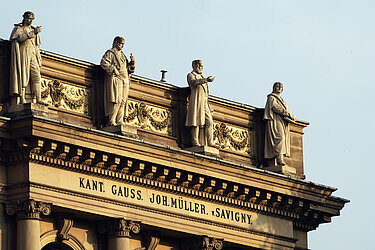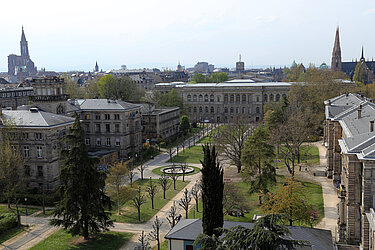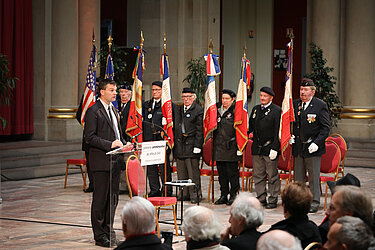![[Translate to English:] [Translate to English:]](/fileadmin/user_upload/Illustrations/headers/bandeau-header_Histoire-Unistra.png)
History of the University of Strasbourg
From the Rhenish humanism of the 16th century to the campus of the 21st century, the University of Strasbourg is one of the largest multilingual and multicultural universities in France, with a particular focus on multidisciplinary and interdisciplinary approaches. It also has three labels of excellence:
- Initiative d'excellence - Investir l'avenir (Idex);
- Bienvenue en France;
- Human Resources Strategy for Research - HRS4R.
For over a hundred years, the University of Strasbourg changed with history. The university vanished during the Revolution but re-emerged in 1870.
This marked the beginning of 50 years of great university development:
- diversification of disciplines;
- arrival of eminent scholars;
- creation of libraries;
- creation of various institutes.
From this time, the University inherited a tradition of research and openness to the world that continues to drive it today.
After becoming French again in 1918, the university left Strasbourg to move to Clermont-Ferrand during the Second World War, and only returned in 1945.
The events of May 68 shook the traditional structures and challenged a university that was becoming sclerotic.
In 1971, the University of Strasbourg became three separate universities:
- Strasbourg I (Université Louis Pasteur) for the scientific disciplines.
- Strasbourg II (Université Marc Bloch in 1998) for humanities and social sciences.
- Strasbourg III (Université Robert Schuman in 1987) for legal, political, social and technological studies.
In 2016, the University of Strasbourg set up an independent, international historical commission at the suggestion of the former rector, Alain Beretz, and the current rector, Michel Deneken. Its mission was to shed light on the history of the Reichuniversität Straßburg between 1941 and 1944. The results of the Historical Commission's research were published on May 3rd 2022.
Since its foundation, the University of Strasbourg has welcomed people who have left their mark in various fields such as science, law, art and literature. Some of them have won the Nobel Prize, while others have gone beyond their field of expertise to achieve an exemplary historical destiny.
Today, the University of Strasbourg counts 18 Nobel laureates, 5 of whom are still active:
- Jean-Pierre Sauvage, 2016 Nobel Prize in Chemistry;
- Martin Karplus, Nobel Prize in Chemistry 2013;
- Jules Hoffmann, Nobel Prize in Physiology or Medicine 2011;
- Richard Schrock, Nobel Prize for Chemistry 2005;
- Jean-Marie Lehn, Nobel Prize for Chemistry 1987.


